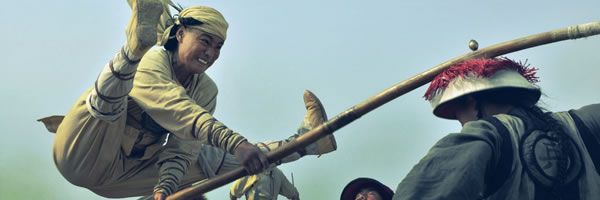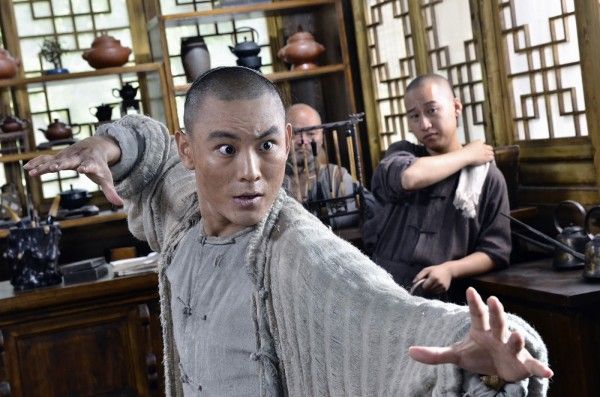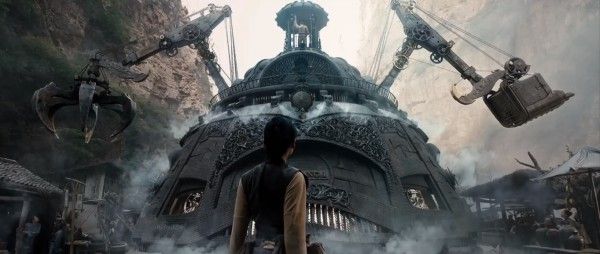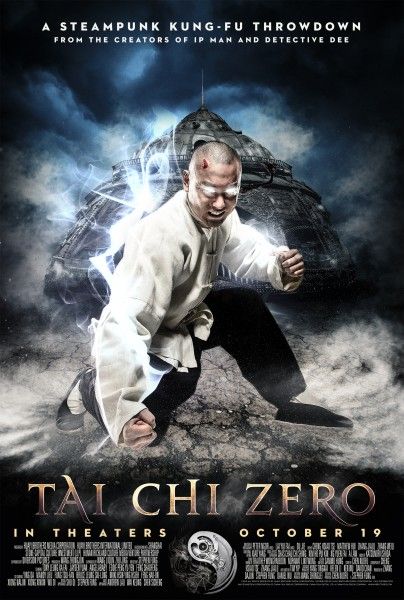Tai Chi Zero is stuck in an East-meets-West, Old-meets-New conundrum. From a filmmaking perspective, it's a perfect blend. Director Stephen Fung has taken a dull kung-fu tale, and imbued with modern sensibilities that playfully break the fourth wall, and use video game and anime inspirations in the visual style. However, Fung can't reconcile his style with the script's anti-technology themes. Tai Chi Zero can be light, goofy fun, but it's eventually dragged down by its familiar story, paper-thin characters, and confused subtext.
Yang Lu Chan (Yuan Xiaochao) is a wide-eyed, happy warrior with two unique attributes. He can pick up any martial arts technique simply by observing it, and he has a horn on his head that when aggravated, sends him into a beast-mode, power-up style that allows him to easily defeat his enemies. However, his current style of kung-fu is killing him because of his horn, and the only way to keep fighting is to learn Chen-style kung-fu. Unfortunately, while everyone in Chen village knows the technique, it's forbidden to teach it to outsiders, and Yang spends most of the movie getting beat up as he pleads to learn from Master Chen (Tony Leung). Meanwhile, another outsider, Fang Zijing (Eddie Peng), has returned to the village as a worker for a Western railroad company. He hopes to finally earn the respect of the villagers, but when he fails to rally their support for modern technology, he resolves to get revenge by building a railroad through the town even though he's married to the Master Chen's daughter, Chen Yunia (Angelbaby).
Fang is so sympathetic in his motives that it's hard to qualify him as a villain. Conversely, Yang is cipher. He always wears a big smile, but we never fully comprehend why he wants to learn Chen-style so badly. He's not fighting for anyone, so if he wants to stay alive, all he needs to do is stop fighting entirely. Thankfully, his quest allows us to spend more time with Yunia, who nicely subverts the love-interest role by becoming Yang's unwitting teacher. The two have eyes for each other, but never in the compelling way of Zijing and his female co-worker, Claire Heathrow (Mandy Lieu).
Fung seems to know that his plot is nothing special other than a few strong characters, so he sets to work on bringing as much visual flair as he can to the proceedings. The result is rapid-fire, bubbly display of movements that help enliven what would otherwise be a forgettable martial arts movie. A flashback is done in the style of a silent film, and graphics pop up on screen to point out cameos, fighting geometry, and Scott Pilgrim-style video game notation. Of course, in Scott Pilgrim, the style fit the personality of the main character. With Tai Chi Zero, they're bright colors and shiny objects meant to distract us from a bland narrative.
Unfortunately, Fung's style is in direct conflict with Kuo-fu Chen's script. The story is fairly shallow (and not in a winking fashion), but there is subtext regarding the encroachment of western influences. Chen village shuns technology, and as a result, it becomes a threat. But the film's entire style is reliant on modern-day technology. Tai Chi Zero is hardly a celebration of classic martial arts when every fight is surrounded by word graphics and diagrams.
Despite the in congruency, Tai Chi Zero still manages to be a lot of fun until it runs out of steam near the end. Fung appears to run out of ways to bring a spark to the story, so we're left going through the motions of a predictable tale. The film becomes even more frustrating without an ending. It's a cliffhanger that has to remember to tell you that there's still more movie left (there's a trailer for the sequel, Tai Chi Hero, in the closing credit). Hopefully, Fung still has some more tricks up his sleeve because that's all Tai Chi Zero really has to offer.
Rating: C+




